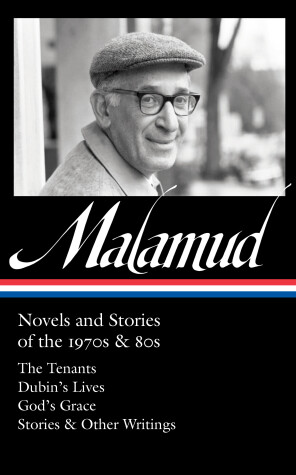LOA
1 primary work
Book 367
The late novels and stories of America’s greatest myth-maker and chronicler of the Jewish American experience
“Is Malamud an American Master? Of course. He not only wrote in the American language, he augmented it with fresh plasticity, he shaped our English into startling new configurations.” —Cynthia Ozick
“[A] short-story writer who is better than any of them, including myself.” —Flannery O’Connor
The long-awaited third and final volume of Library of America’s edition of Bernard Malamud’s writings brings together three novels and thirteen stories of the 1970s and 80s that reaffirm his place in the American pantheon.
The Tenants (1971) chronicles the growing tensions between two male writers—one Jewish, the other Black—who are the only inhabitants of a crumbling Manhattan tenement house.
Dubin’s Lives (1976) is a fascinating portrait of a middle-aged biographer who becomes involved with a woman half his age while researching a life of D.H. Lawrence—an affair that unsettles things in expected and unexpected ways.
God’s Grace (1982) is a wildly inventive, darkly humorous postapocalyptic novel whose cast includes the lone human survivor of the Day of Devastation, a group of talking chimps, and other (speechless) primates—who try to establish a New Covenant with God.
The stories in this volume confirm Malamud as a master storyteller, from the Kafkaesque unbridled fantasy of “Talking Horse” to the final “fictive biographies” of “In Kew Gardens,” about Virginia Woolf, and “Alma Redeemed,” about the Austrian composer Alma Mahler. Rounding out the volume are “Long Work, Short Life,” Malamud’s hard-to-find “casual memoir” about his writing life, and the previously unpublished “A Lost Bar-Mitzvah,” a poignant sketch of Malamud’s own childhood. This deluxe edition includes a chronology of Malamud's life and career and detailed notes by Malamud biographer Philip Davis.
“Is Malamud an American Master? Of course. He not only wrote in the American language, he augmented it with fresh plasticity, he shaped our English into startling new configurations.” —Cynthia Ozick
“[A] short-story writer who is better than any of them, including myself.” —Flannery O’Connor
The long-awaited third and final volume of Library of America’s edition of Bernard Malamud’s writings brings together three novels and thirteen stories of the 1970s and 80s that reaffirm his place in the American pantheon.
The Tenants (1971) chronicles the growing tensions between two male writers—one Jewish, the other Black—who are the only inhabitants of a crumbling Manhattan tenement house.
Dubin’s Lives (1976) is a fascinating portrait of a middle-aged biographer who becomes involved with a woman half his age while researching a life of D.H. Lawrence—an affair that unsettles things in expected and unexpected ways.
God’s Grace (1982) is a wildly inventive, darkly humorous postapocalyptic novel whose cast includes the lone human survivor of the Day of Devastation, a group of talking chimps, and other (speechless) primates—who try to establish a New Covenant with God.
The stories in this volume confirm Malamud as a master storyteller, from the Kafkaesque unbridled fantasy of “Talking Horse” to the final “fictive biographies” of “In Kew Gardens,” about Virginia Woolf, and “Alma Redeemed,” about the Austrian composer Alma Mahler. Rounding out the volume are “Long Work, Short Life,” Malamud’s hard-to-find “casual memoir” about his writing life, and the previously unpublished “A Lost Bar-Mitzvah,” a poignant sketch of Malamud’s own childhood. This deluxe edition includes a chronology of Malamud's life and career and detailed notes by Malamud biographer Philip Davis.
